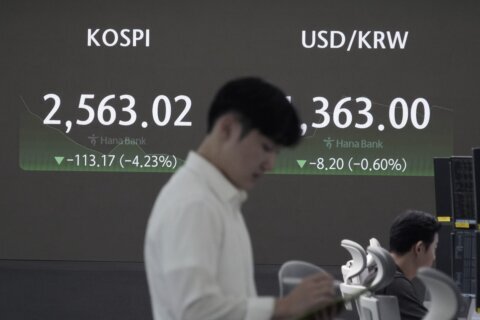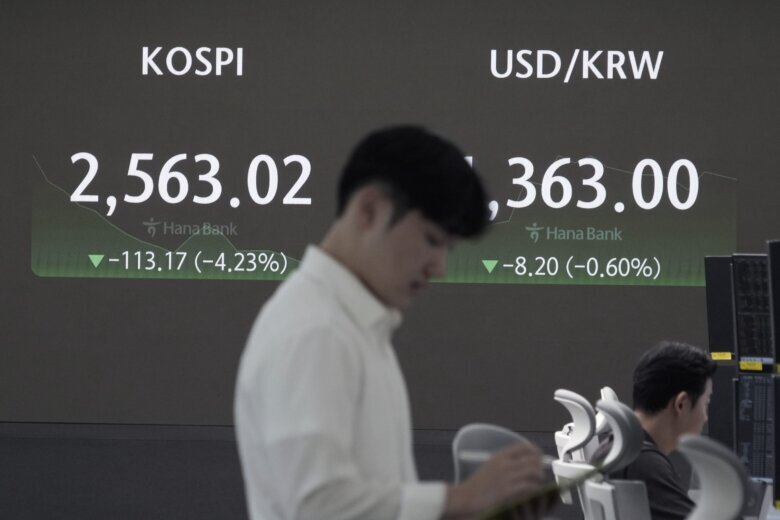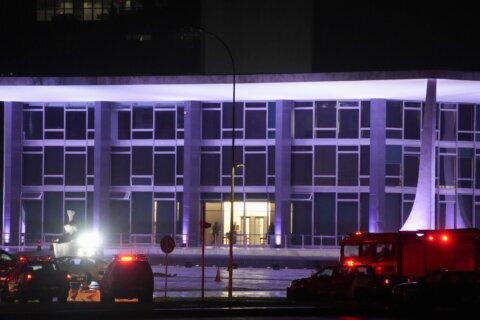
NEW YORK (AP) — Japan’s benchmark Nikkei 225 index soared nearly 11% early Tuesday, a day after it set markets tumbling in Europe and on Wall Street.
The Japanese index advanced more than 3,300 points, not quite making up for the huge loss of more than 4,400 points the day before, when it plunged 12.4% in its worst single-day decline since 1987.
The scary Monday started with a plunge abroad reminiscent of 1987 ’s crash swept around the world and pummeled Wall Street with more steep losses, as fears worsened about a slowing U.S. economy.
The S&P 500 dropped 3% for its worst day in nearly two years. The Dow Jones Industrial Average reeled by 1,033 points, or 2.6%, while the Nasdaq composite slid 3.4% as Apple, Nvidia and other Big Tech companies that used to be the stars of the stock market continued to wilt.
The drops were the latest in a global sell-off that began last week, and it was the first chance for traders in Tokyo to react to Friday’s report showing U.S. employers slowed their hiring last month by much more than economists expected. That was the latest piece of data on the U.S. economy to come in weaker than expected, and it’s all raised fear the Federal Reserve has pressed the brakes on the U.S. economy by too much for too long through high interest rates in hopes of stifling inflation.
Professional investors cautioned that some technical factors could be amplifying the action in markets, and that the drops may be overdone, but the losses were still neck-snapping. South Korea’s Kospi index careened 8.8% lower, and bitcoin dropped below $54,000 from more than $61,000 on Friday.
Even gold, which has a reputation for offering safety during tumultuous times, slipped about 1%.
That’s in part because traders began wondering if the damage has been so severe that the Federal Reserve will have to cut interest rates in an emergency meeting, before its next scheduled decision on Sept. 18. The yield on the two-year Treasury, which closely tracks expectations for the Fed, briefly sank below 3.70% during the morning from 3.88% late Friday and from 5% in April. It later recovered and pulled back to 3.89%.
“The Fed could ride in on a white horse to save the day with a big rate cut, but the case for an inter-meeting cut seems flimsy,” said Brian Jacobsen, chief economist at Annex Wealth Management. “Those are usually reserved for emergencies, like COVID, and an unemployment rate of 4.3% doesn’t really seem like an emergency.”
Of course, the U.S. economy is still growing, the U.S. stock market is still up a healthy amount for the year and a recession is far from a certainty. The Fed has been clear about the tightrope it began walking when it started hiking rates sharply in March 2022: Being too aggressive would choke the economy, but going too soft would give inflation more oxygen and hurt everyone.
Goldman Sachs economist David Mericle sees a higher chance of a recession within the next 12 months following Friday’s jobs report. But he still sees only a 25% probability of that, up from 15%, in part “because the data look fine overall” and he does not “see major financial imbalances.”
Some of Wall Street’s recent declines may simply be air coming out of a stock market that romped to dozens of all-time highs this year, in part on a frenzy around artificial-intelligence technology. Critics have been saying for a while that the stock market looked expensive after prices rose faster than corporate profits.
“Markets tend to move higher like they’re climbing stairs, and they go down like they’re falling out a window,” according to JJ Kinahan, CEO of IG North America. He chalks much of the recent worries to euphoria around AI subsiding, with pressure rising on companies to show how AI is turning into profits, and “a market that was ahead of itself.”
The only way for stocks to look less expensive is either for prices to fall or for their profits to strengthen. Expectations are still high for the latter, with growth for S&P 500 profits this past quarter looking to be the strongest since 2021.
Professional investors also pointed to the Bank of Japan’s move last week to raise its main interest rate from nearly zero. Such a move helps boost the value of the Japanese yen, but it could also force traders to scramble out of deals where they borrowed money for virtually no cost in Japan and invested it elsewhere around the world.
Treasury yields also pared their losses Monday after a report said growth for U.S. services businesses was a touch stronger than expected. Growth was led by arts, entertainment and recreation businesses, along with accommodations and food services, according to the Institute for Supply Management.
Still, stocks of companies whose profits are most closely tied to the economy’s strength took sharp losses on the fears about a slowdown. The small companies in the Russell 2000 index dropped 3.3%, washing out what had been a revival for it and other beaten-down areas of the market.
Making things worse for Wall Street, Big Tech stocks tumbled as the market’s most popular trade for much of this year continued to unravel. Apple, Nvidia and a handful of other Big Tech stocks known as the “ Magnificent Seven ” had propelled the S&P 500 to record after record this year, even as high interest rates weighed down much of the rest of the stock market.
But Big Tech’s momentum turned last month on worries investors had taken their prices too high and expectations for future growth are becoming too difficult to meet. A set of underwhelming profit reports that began with updates from Tesla and Alphabet added to the pessimism and accelerated the declines.
Apple fell 4.8% Monday after Warren Buffett’s Berkshire Hathaway disclosed that it had slashed its ownership stake in the iPhone maker.
Nvidia, the chip company that’s become the poster child of Wall Street’s AI bonanza, fell even more, 6.4%. Analysts cut their profit forecasts over the weekend for the company after a report from The Information said Nvidia’s new AI chip is delayed. The recent selling has trimmed Nvidia’s gain for the year to nearly 103% from 170% in the middle of June.
Another Big Tech titan, Alphabet, fell 4.4% after a U.S. judge ruled Google’s search engine has been illegally exploiting its dominance to squash competition and stifle innovation.
All told, the S&P 500 fell 160.23 points to 5,186.33. The Dow sank 1,033.99 to 38,703.27, and the Nasdaq composite tumbled 576.08 to 16,200.08.
Worries outside corporate profits, interest rates and the economy are also weighing on the market. The Israel-Hamas war may be worsening, which beyond its human toll could cause sharp swings for the price of oil. That’s adding to broader worries about potential hotspots around the world, while upcoming U.S. elections could further scramble things.
Wall Street has been concerned about how policies coming out of November could impact markets, but the sharp swings for stock prices could affect the election itself.
The threat of a recession is likely to put Vice President Kamala Harris on the defensive. But slower growth could also further reduce inflation and force former President Donald Trump to pivot from his current focus on higher prices to outlining ways to revive the economy.
“It comes down to jobs,” said Quincy Krosby, chief global strategist for LPL Financial. Jobs drive spending by U.S. consumers, which in turn is the biggest part of the U.S. economy.
“When we get to election day, the unemployment rate is going to be extremely important.”
___
AP Business Writers Elaine Kurtenbach, Matt Ott, Christopher Rugaber and Damian J. Troise contributed.
Copyright © 2024 The Associated Press. All rights reserved. This material may not be published, broadcast, written or redistributed.








